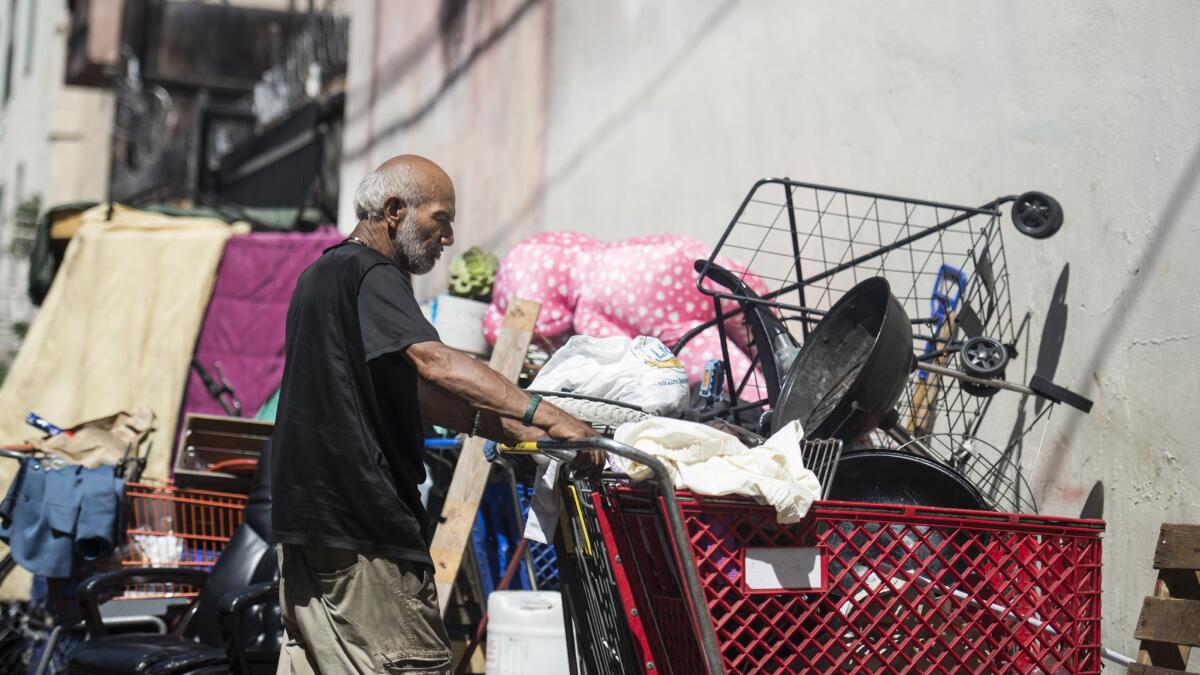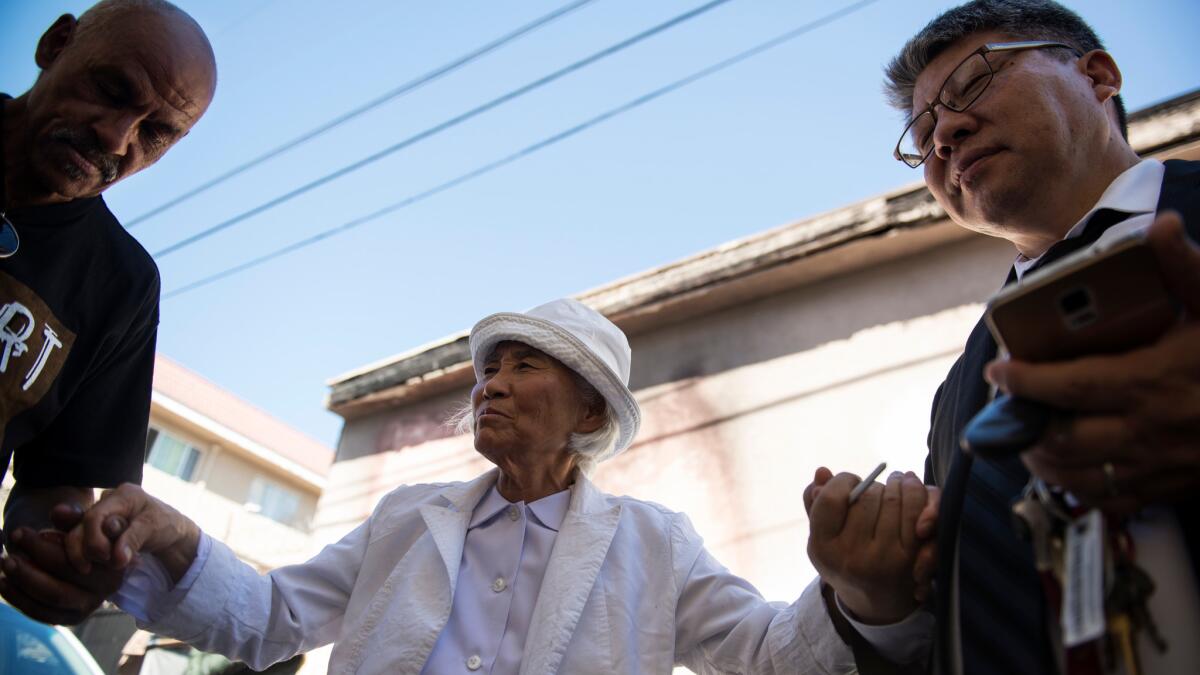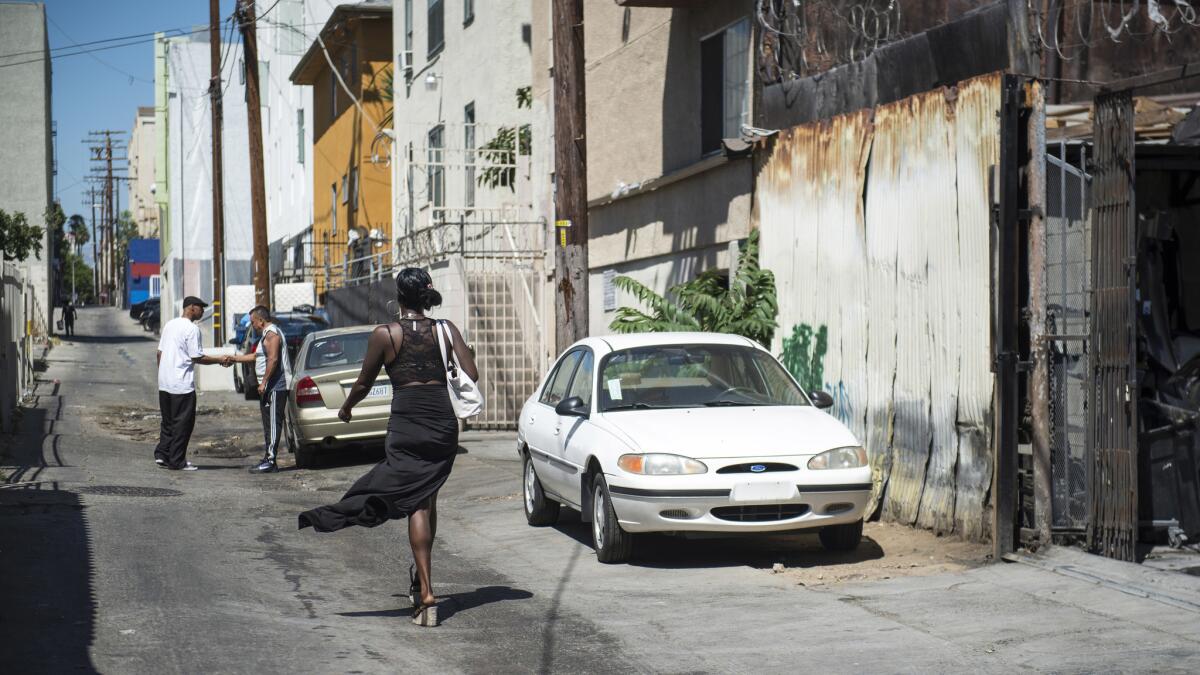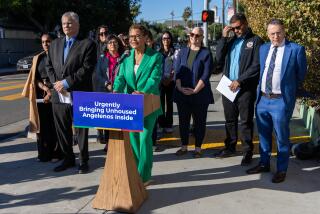Friends mourn ‘Mother Teresa of the homeless,’ who lived in an alley for 30 years

Beloved by the homeless community, Ida Mae Prince, who lived on the streets of Westlake for more than three decades, was buried in Los Angeles on Monday.
Ida Mae Prince survived 30 years in a Westlake alley, sharing food and her makeshift plywood shanty with other homeless people, and helping many get off the streets that held her to the last.
When she died of cancer last month at age 58, Prince’s remains appeared destined for cremation or a lonely burial in a pauper’s grave. Then evangelist Gloria Kim, a longtime street minister to the homeless, mobilized. On Monday, Prince was buried with full solemnity at a graveside service.
Several members of her street “family” sobbed as Father Anthony Garcias, associate pastor at St. John Chrysostom parish in Inglewood, prayed over Prince, who was dressed in white and arrayed in a powder-blue casket on a breezy hillside with a panoramic view of Culver City. At Kim’s behest, the expense — $10,000 or more — was picked up by St. John Chrysostom and Holy Cross Cemetery.
“She was very special,” said Kim, 75.
Years ago, Prince fled an abusive husband in the Bay Area for Los Angeles, friends said. But they could add little else to fill in her biography, which is not unusual in homeless circles, where the past is something to escape and not to share.
Streetwalkers and addicts were among the homeless people she helped counsel off the street, friends said at an impromptu wake later Monday in the alley not far from MacArthur Park. Sahara McFadden, 31, said Prince put her up in her lean-to so she could get clean and have her son, now 4, drug-free in the hospital.
Several women insisted that they were her real daughters, although other mourners said they knew of no blood kin.
“She taught so many ladies of the night how to conduct themselves,” said Berval Cato, 53. “With this particular addiction, sometimes people in desperation would put themselves at risk. She would clear it up and give them an education.”
People whose lives she helped turned around would come back to spend time with her, said Cody Atkins, a former cocaine addict who now lives in Hollywood but still visits the alley regularly.
“I have seen them pull in here in their own cars, bicycles hanging out, with jobs,” said Atkins, 61. “She was the Mother Teresa of the homeless.”
“Everybody came here under the influence of speed, meth, alcohol and dope, still wallowing in shame. She was able to find a frequency for all of them,” said Alex Quincy Barlow, 55. “She’d say you’re not going to stay here long, you know it’s a trap.”

Los Angeles police Sgt. Darius Trugman said he was broken up by the passing of Prince, tweeting that she was an “unlikely friend” who taught him “so much about policing.”
“She put other people ahead of herself,” Trugman said in a phone interview Wednesday.
The shopkeepers all knew her, the local gang left her alone, and she would defend Trugman against loudmouths who trashed the police, he said, adding: “And I was the one with a badge and gun.”
He said he would sometimes find her in her tent with a much younger man. “She would play it off, ‘Oh sugar, I’m just hanging out,’” he said. “She kept everyone in check.“
He and other officers helped get her into apartments for months at a time, close by where she could visit with friends, Trugman said. But she always came back to the streets.
“The alley, that was her spot,” he said.

Prince’s friendship with Kim, of Zion Gospel Mission, went back 30 years, when the pastor began dispensing soup, water and fruit to L.A.’s homeless people from the back of a van.
Kim is a street legend in her own right. Prince was one of the few who could decipher Kim’s thick accent. With a fine singing voice and lively dancing, Prince would help the pastor work up the crowd, friends said.
The cancer struck last year. After an operation, Prince’s caretaker brought her to the alley in a wheelchair for a long visit, and she later “popped back” up in her lean-to, where the women helped her bathe and dress herself, said Alecia Mahoney, 50, one of her longtime friends.
But she “wasn’t in the best of shape,” Mahoney said. Prince died July 19 in hospice care in Inglewood, Kim said.
Kim arranged a viewing before the service “all for us, so we could see her again,” Mahoney said. “She looked so beautiful today, our old vibrant Ida. She was sent out like the queen that she was.”
Several mourners said they would try to keep her lean-to open as a refuge for homeless people.
“This is a dark place. Ida represented light in a dark place,” Barlow said. “If a homeless woman can feed an undetermined number of people, that’s God.”

Twitter: @geholland
ALSO
Trump shows a new emotion — regret
Rio police call swimmers’ story of robbery a fabrication; USOC issues apology
Scientists unlock a secret to Latinos’ longevity, with hopes of slowing aging for everyone
More to Read
Sign up for Essential California
The most important California stories and recommendations in your inbox every morning.
You may occasionally receive promotional content from the Los Angeles Times.










